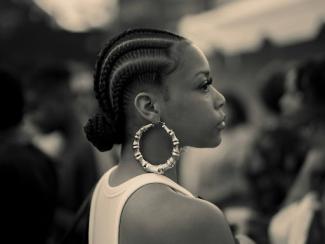
Beyoncé isn't the only one of us who likes her baby hair, with baby hair and afros. Baby hairs aren't just strands of protein growing out of our heads — they are a canvas for self-expression and self-love. With their finessed swoops that cling to frame the face, baby hairs have been a thing for a minute.
Initially, laying baby hair was a way to make our hair "more presentable" by adhering to Eurocentric beauty standards. The popularization of the short, sleek hairstyle known as the "Eton Crop" can be credited to Josephine Baker. This iconic hairstyle, characterized by its close-cropped finish and smooth silhouette, quickly became a symbol of individuality and modernity in the 1920s.
By the end of the 1930s, the style faded into Black hair history. It wasn't until nearly four decades later that baby hairs returned with a vengeance. The '60s and '70s centralized not just a natural Black hair movement but also self-love and expression.
Styling baby hair became a way to showcase Black creativity and feel bold and confident in our natural hair. Black hair has been politicized and scrutinized for centuries, but today, it is embraced more than ever as a symbol of empowerment, identity, and self-love.
Whether it's rocking afros or protective styles, our baby hairs are on display as a love letter to our hair and ourselves. So next time you see us rocking baby hairs on full display, remember that it's more than just hair. It's a declaration of self-love.